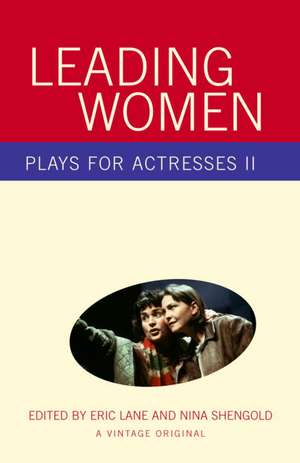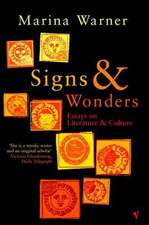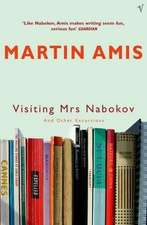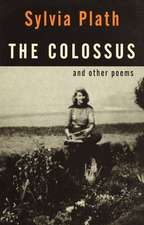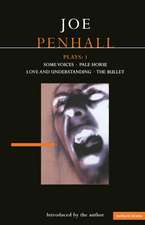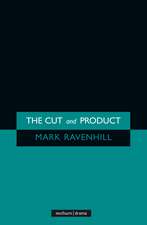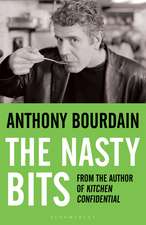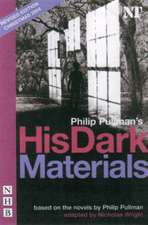Leading Women: Plays for Actresses 2
Editat de Eric Lane, Nina Shengolden Limba Engleză Paperback – 31 iul 2002
The editors of the groundbreaking anthology Plays for Actresses have once again gathered an abundance of strong female roles in a selection of works by award-winning authors and cutting-edge newer voices, from Wendy Wasserstein and Christopher Durang to Claudia Shear, Eve Ensler, and Margaret Edson. The characters who populate these seven full-length plays, four ten-minute plays, and eleven monologues include a vivid cross-section of female experience: girl gang members, Southern debutantes, pilots, teachers, traffic reporters, and rebel teenagers. From a hilarious take on Medea to a taboo-breaking excerpt from The Vagina Monologues to a moving scene from the Pulitzer Prize-winning Wit, the plays in Leading Women are complex, funny, tragic, and always original--and a boon for talented actresses everywhere.
Preț: 161.90 lei
Nou
Puncte Express: 243
Preț estimativ în valută:
30.98€ • 32.34$ • 25.64£
30.98€ • 32.34$ • 25.64£
Carte disponibilă
Livrare economică 15-29 martie
Preluare comenzi: 021 569.72.76
Specificații
ISBN-13: 9780375726668
ISBN-10: 0375726667
Pagini: 640
Dimensiuni: 132 x 204 x 27 mm
Greutate: 0.45 kg
Editura: Vintage Publishing
ISBN-10: 0375726667
Pagini: 640
Dimensiuni: 132 x 204 x 27 mm
Greutate: 0.45 kg
Editura: Vintage Publishing
Notă biografică
Eric Lane is an award-winning playwright, filmmaker and book editor. Plays include: Times of War, Cater-Waiter and Dancing on Checkers’ Grave, which starred Jennifer Aniston. His new play Heart of the City has been optioned for off-Broadway. Eric has written and produced two short films: First Breath and Cater-Waiter, which he also directed. Honors include a Writer’s Guild Award, La MaMa Playwright Award, Berrilla Kerr Award and two-time O’Neill Center finalist. He has won fellowships at Yaddo and St. James Cavalier in Malta. With Nina Shengold, he has edited ten contemporary play anthologies for Penguin and Vintage Books, earning them a Lambda Literary Award nomination. Eric is Artistic Director of Orange Thoughts Productions, a not-for-profit theater & film company in New York City.
Extras
INTRODUCTION
One of the first things you learn in drama school is that there are more roles for men than for women. This is a wonderful thing to learn because it is true of the real world as well.
—from Medea by Christopher Durang and Wendy Wasserstein
Actresses deserve better roles. This was our premise four years ago when we edited the Vintage anthology Plays for Actresses, a collection of seventeen plays with all-female casts. The response was overwhelming. The book became an instant bestseller among actresses. Teachers ordered it as an acting class text and monologue sourcebook. Most gratifying of all were the letters from playwrights, who told us about the new productions the anthology sparked—many mounted by groups of actresses who had banded together to produce plays that showcased their talents.
We’re thrilled to be publishing this brand-new collection. You’ll find an abundance of plays with all-female casts, along with a few that have one or more male roles but center on strong female leads. We selected the plays with an eye to variety, including works by award-winning authors and cutting-edge newer voices, with challenging roles for women of various ages and ethnic backgrounds. There are full-length and one-act plays, dramas and comedies, two-handers and ensemble pieces. We’ve also added a monologue section, which offers wonderful audition material and a sneak peek at even more plays for actresses.
The characters who populate the seven full-length plays in this book represent an amazing cross section of female experience: girl gang members, Southern debutantes, pilots, teachers, traffic reporters, rebel teenagers—and, of course, authors and actresses.
Jane Martin’s screwball farce Anton in Show Business goes behind the scenes of a regional theater production of Chekhov’s The Three Sisters as it spins wildly out of control. Its seven-woman cast plays multiple roles, ranging from a silicone-filled TV star to a gay male director to audience members who never shut up. In Collected Stories, Pulitzer Prize–winning playwright Donald Margulies examines the shifting relationship between a celebrated author and the grad student protégée who idolizes, then betrays her.
The Black and Latina gang members of Kia Corthron’s Breath, Boom speak a raw and immediate street poetry that lights their bleak lives like the fireworks its heroine dreams of creating. The ensemble cast includes juicy roles for as many as eighteen women. In Five Women Wearing the Same Dress, by American Beauty Oscar winner Alan Ball, the Southern bridesmaids stuck in identical taffeta gowns are one-of-a-kind individuals, as is the lone male who joins them.
Julia Jordan’s Smoking Lesson and Diana Son’s Stop Kiss are an acting class bonanza, filled with scenes for young actresses. Smoking Lesson takes place under the railroad trestle where three Midwestern girls once found a drowned child. Every year, the girls return on the anniversary, and tonight, their fifteen-year-old leader will tempt fate with the older male drifter accused of the crime. The multilayered Stop Kiss alternates two story lines, which take place before and after its central event. In the first, we watch two hip and witty young women, who both see themselves as straight, tentatively exploring the bounds of their friendship; in the second, we witness the aftermath of the brutal gay bashing spurred by their first kiss.
Tongue of a Bird, by actress/playwright Ellen McLaughlin, is a striking theatrical portrait of a female search-and-rescue pilot. In her obsessive search for an abducted teenage girl, she comes face-to-face with her own ghosts.
For actresses looking for shorter scripts, we’ve included four ten-minute plays. To paraphrase Spencer Tracy’s description of Katharine Hepburn: There’s not much meat on them, but what’s there is choice. Durang and Wasserstein’s hilarious take on Medea is joined by two equally lunatic comedies: Laura Shaine Cunningham’s “Happy Talkin’,” in which a lonely woman is pursued by a tribe of surreal telemarketers, and Mary Louise Wilson’s “Lost,” a portrait of two aging friends who can’t remember a thing. In Nina Shengold’s ten-minute drama “No Shoulder,” a childless woman discovers an unforeseen bond with a teenage hitchhiker.
Actresses looking for solo material will find an extraordinary range of women’s voices in our new monologue section. Three of these excerpts are from one-woman shows: Eve Ensler’s taboo-breaking hit The Vagina Monologues; Claudia Shear’s Blown Sideways Through Life, an exuberant hymn to temporary employment; and Rose, Martin Sherman’s portrait of a feisty Jewish widow whose life spans three continents and most of the twentieth century.
Warren Leight’s The Princess of Babylon and Michelle Carter’s Hillary and Soon-Yi Shop for Ties shed light on two teenagers best known from the tabloids: Amy Fisher and Soon-Yi Previn. Both pieces were first performed in anthology evenings of monologues, scenes, and (in Carter’s case) songs by their authors.
The six remaining monologues are excerpted from full-length plays with many strong female roles. These include Lynn Nottage’s Crumbs from the Table of Joy, a memory play about an interracial marriage; Jenny Lyn Bader’s quick-witted romantic comedy Manhattan Casanova; Migdalia Cruz’s Miriam’s Flowers, a searing look at a teenage girl driven to self-mutilation; Eric Lane’s Times of War, a lyrical trilogy that follows one woman’s journey over fifty years; Sherry Kramer’s What a Man Weighs, a highly original study of love and compulsion; and Margaret Edson’s Pulitzer Prize–winning Wit, whose scholarly heroine battles with cancer. If any of these monologues speaks to you, go out and read the entire play. (Contact information for productions appears at the back of this book.)
Finding the plays for this book was a joy and privilege. We hope Leading Women will introduce readers to some of the finest writers working today. Their plays are complex, funny, tragic, and always original. We also hope that actresses frustrated by the lack of roles in the marketplace will find ways to bring these characters to life. Put together an evening of scenes, rehearse a staged reading, produce your own showcase or production. You’ll find audiences all over the world who long to see plays about women’s lives, just as actresses everywhere long to perform them. Go out there and find one another. The words are right here.
Nina Shengold and Eric Lane
May 2001
One of the first things you learn in drama school is that there are more roles for men than for women. This is a wonderful thing to learn because it is true of the real world as well.
—from Medea by Christopher Durang and Wendy Wasserstein
Actresses deserve better roles. This was our premise four years ago when we edited the Vintage anthology Plays for Actresses, a collection of seventeen plays with all-female casts. The response was overwhelming. The book became an instant bestseller among actresses. Teachers ordered it as an acting class text and monologue sourcebook. Most gratifying of all were the letters from playwrights, who told us about the new productions the anthology sparked—many mounted by groups of actresses who had banded together to produce plays that showcased their talents.
We’re thrilled to be publishing this brand-new collection. You’ll find an abundance of plays with all-female casts, along with a few that have one or more male roles but center on strong female leads. We selected the plays with an eye to variety, including works by award-winning authors and cutting-edge newer voices, with challenging roles for women of various ages and ethnic backgrounds. There are full-length and one-act plays, dramas and comedies, two-handers and ensemble pieces. We’ve also added a monologue section, which offers wonderful audition material and a sneak peek at even more plays for actresses.
The characters who populate the seven full-length plays in this book represent an amazing cross section of female experience: girl gang members, Southern debutantes, pilots, teachers, traffic reporters, rebel teenagers—and, of course, authors and actresses.
Jane Martin’s screwball farce Anton in Show Business goes behind the scenes of a regional theater production of Chekhov’s The Three Sisters as it spins wildly out of control. Its seven-woman cast plays multiple roles, ranging from a silicone-filled TV star to a gay male director to audience members who never shut up. In Collected Stories, Pulitzer Prize–winning playwright Donald Margulies examines the shifting relationship between a celebrated author and the grad student protégée who idolizes, then betrays her.
The Black and Latina gang members of Kia Corthron’s Breath, Boom speak a raw and immediate street poetry that lights their bleak lives like the fireworks its heroine dreams of creating. The ensemble cast includes juicy roles for as many as eighteen women. In Five Women Wearing the Same Dress, by American Beauty Oscar winner Alan Ball, the Southern bridesmaids stuck in identical taffeta gowns are one-of-a-kind individuals, as is the lone male who joins them.
Julia Jordan’s Smoking Lesson and Diana Son’s Stop Kiss are an acting class bonanza, filled with scenes for young actresses. Smoking Lesson takes place under the railroad trestle where three Midwestern girls once found a drowned child. Every year, the girls return on the anniversary, and tonight, their fifteen-year-old leader will tempt fate with the older male drifter accused of the crime. The multilayered Stop Kiss alternates two story lines, which take place before and after its central event. In the first, we watch two hip and witty young women, who both see themselves as straight, tentatively exploring the bounds of their friendship; in the second, we witness the aftermath of the brutal gay bashing spurred by their first kiss.
Tongue of a Bird, by actress/playwright Ellen McLaughlin, is a striking theatrical portrait of a female search-and-rescue pilot. In her obsessive search for an abducted teenage girl, she comes face-to-face with her own ghosts.
For actresses looking for shorter scripts, we’ve included four ten-minute plays. To paraphrase Spencer Tracy’s description of Katharine Hepburn: There’s not much meat on them, but what’s there is choice. Durang and Wasserstein’s hilarious take on Medea is joined by two equally lunatic comedies: Laura Shaine Cunningham’s “Happy Talkin’,” in which a lonely woman is pursued by a tribe of surreal telemarketers, and Mary Louise Wilson’s “Lost,” a portrait of two aging friends who can’t remember a thing. In Nina Shengold’s ten-minute drama “No Shoulder,” a childless woman discovers an unforeseen bond with a teenage hitchhiker.
Actresses looking for solo material will find an extraordinary range of women’s voices in our new monologue section. Three of these excerpts are from one-woman shows: Eve Ensler’s taboo-breaking hit The Vagina Monologues; Claudia Shear’s Blown Sideways Through Life, an exuberant hymn to temporary employment; and Rose, Martin Sherman’s portrait of a feisty Jewish widow whose life spans three continents and most of the twentieth century.
Warren Leight’s The Princess of Babylon and Michelle Carter’s Hillary and Soon-Yi Shop for Ties shed light on two teenagers best known from the tabloids: Amy Fisher and Soon-Yi Previn. Both pieces were first performed in anthology evenings of monologues, scenes, and (in Carter’s case) songs by their authors.
The six remaining monologues are excerpted from full-length plays with many strong female roles. These include Lynn Nottage’s Crumbs from the Table of Joy, a memory play about an interracial marriage; Jenny Lyn Bader’s quick-witted romantic comedy Manhattan Casanova; Migdalia Cruz’s Miriam’s Flowers, a searing look at a teenage girl driven to self-mutilation; Eric Lane’s Times of War, a lyrical trilogy that follows one woman’s journey over fifty years; Sherry Kramer’s What a Man Weighs, a highly original study of love and compulsion; and Margaret Edson’s Pulitzer Prize–winning Wit, whose scholarly heroine battles with cancer. If any of these monologues speaks to you, go out and read the entire play. (Contact information for productions appears at the back of this book.)
Finding the plays for this book was a joy and privilege. We hope Leading Women will introduce readers to some of the finest writers working today. Their plays are complex, funny, tragic, and always original. We also hope that actresses frustrated by the lack of roles in the marketplace will find ways to bring these characters to life. Put together an evening of scenes, rehearse a staged reading, produce your own showcase or production. You’ll find audiences all over the world who long to see plays about women’s lives, just as actresses everywhere long to perform them. Go out there and find one another. The words are right here.
Nina Shengold and Eric Lane
May 2001
Descriere
Showcasing several Pulitzer- and Academy Award-winning playwrights, as well as pieces by cutting edge Off-Broadway and regional theater writers, "Leading Women" presents challenging roles for women of all ages, experiences, and ethnic backgrounds.
